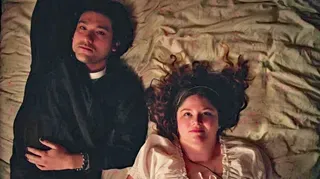August 8, 2012
Michael Jackson's Costumer Unveils Book
Mark Thompson READ TIME: 4 MIN.
LOS ANGELES (AP) - The zipper-covered "Beat It" jacket. The military-inspired coats with their epaulets, crests and insignias. And, of course, that glittery glove.
Michael Jackson's fashion sense was as singular as his musical style and dance moves. Millions imitated his pegged pants and penny loafers, a fedora cocked just so.
Jackson's longtime costumer reveals the secrets behind the King of Pop's meticulously crafted, regal rock-star look - and an intimate glimpse into the man himself - in a colorful new book, "The King of Style: Dressing Michael Jackson."
"When you worked with him, you couldn't wait to get there and you didn't want to leave when you got done," said author/costume designer Michael Bush, who with his late partner, Dennis Tompkins, dressed Jackson for more than a generation. "It was hard to imagine anyone that projected fashion and style any better."
What most people don't know about Jackson, Bush said, is he was a joker - a playful prankster who loved to laugh and often teased those closest to him the most.
Bush tells of meeting Jackson for the first time in 1983, when both men were 25. The King of Pop hadn't retained a costumer yet, and Bush was up for consideration. Jackson had been holed up for hours in his trailer on the set of "Captain EO." Bush could hear a monkey squealing as he approached. It was dark inside and "like 120 degrees." Jackson was snacking.
Eager to please as he prepped the pop star's clothes, Bush felt something hit him gently in the head. A cherry stem. A few seconds later, it happened again. When it happened a third time, Bush lobbed a cherry at the rising superstar. Jackson tossed a handful back, and thus began a close professional and personal relationship that spanned the remainder of Jackson's life.
"I think he wanted someone he could play with. He just wanted to see, 'Am I going to have fun with this person?'" said Bush, now 54, an almost sheepish, informally trained clothier from Ohio who learned his craft from his mom and grandmother, who made wedding gowns, prom dresses and quilts.
"And I laughed every day until he died."
Bush wouldn't discuss the time Jackson wore pajama bottoms to court during his child-molestation trial in 2005, but relished in other details of the entertainer's unique approach to his performance attire.
"Michael's concept was, 'I want the fashion designers in the world, the big conglomerates, I want them to copy me. I don't want to wear what's out there. I want to push my individuality, and being that my music is me, my look should be me,'" Bush said in an interview at a warehouse in Los Angeles, racks of glittery history behind him.
Jackson's stage costumes were designed to display his dance moves, so Bush and Tompkins, who died last December, were treated to regular private dance recitals to inform their work. Jackson danced five or six hours a day whether he was on tour or not, Bush said: "He traveled with a hardwood floor in a road case."
All that dancing, such as during the 1987 "Bad" world tour, meant Jackson could drop so much weight during a concert that the costumes for his closing numbers had to be smaller than the ones for the show openers.
"Michael was usually a 28-inch waist, but by the midpoint of the show, when he was ready to perform his magic act of choice, right before 'Beat It,' he'd already lost five pounds of water, and his waist dropped to 27 and a quarter," Bush writes in "The King of Style." ''If we didn't have clothes hanging on the rack in the right order that were getting progressively smaller, we'd risk him putting on a pair of pants that would fall to his ankles with each rhythmic move of his body And there is no magic in that!"
The King of Pop preferred China silk, silk charmeuse and stretchy fabrics. "Spandex made Michael feel sleek and secure and worked for his dance style," Bush writes.
Then there were the military jackets, the rhinestone-encrusted interpretations of British war uniforms like the one Jackson wore at the 1984 Grammy Awards, when he raked in a record eight awards for "Thriller."
Jackson had a childlike fascination with rhinestones, Bush said.
"Sometimes I'd drive three hours to retrieve loose rhinestones straight from the factory, just because looking at them in that raw form pleased Michael to no end. Every time I opened the swatch of white felt that encased the rhinestones, he'd gasp," he writes. "He'd take them from me and delicately move them around with his fingertips and whisper... 'Can you imagine being a pirate opening a treasure chest? And seeing all the glitter inside? What a fascinating life, to be a pirate like that.'"
Bush and Tompkins worked with Jackson until the pop star's death in June 2009. Though they weren't in charge of the costumes for the ill-fated "This Is It" comeback tour, Jackson's longtime costume designers created ensembles for seven songs, including a reprise of his "Billie Jean" outfit with its loafers and spangled socks. There was also a burgundy and gold monogrammed top with a Chinese collar and bell sleeves, and a pair of black bedazzled shin guards.
Bush declined to share any details about Jackson's health or demeanor in his final days. He did say, though, that the King of Pop had always hoped his costumes would be celebrated in books and museums, and Bush is humbled by making that dream a reality. The costumer will exhibit some of Jackson's performance outfits in South America, Europe and Asia before releasing his book on Oct. 30. Many of the costumes will be sold at auction in December, with a portion of the proceeds benefiting the Recording Academy's MusiCares charity.
___
Online:
www.dressingmichaeljackson.com
A long-term New Yorker and a member of New York Travel Writers Association, Mark Thompson has also lived in San Francisco, Boston, Provincetown, D.C., Miami Beach and the south of France. The author of the novels WOLFCHILD and MY HAWAIIAN PENTHOUSE, he has a PhD in American Studies and is the recipient of fellowships at MacDowell, Yaddo, and Blue Mountain Center. His work has appeared in numerous publications.




